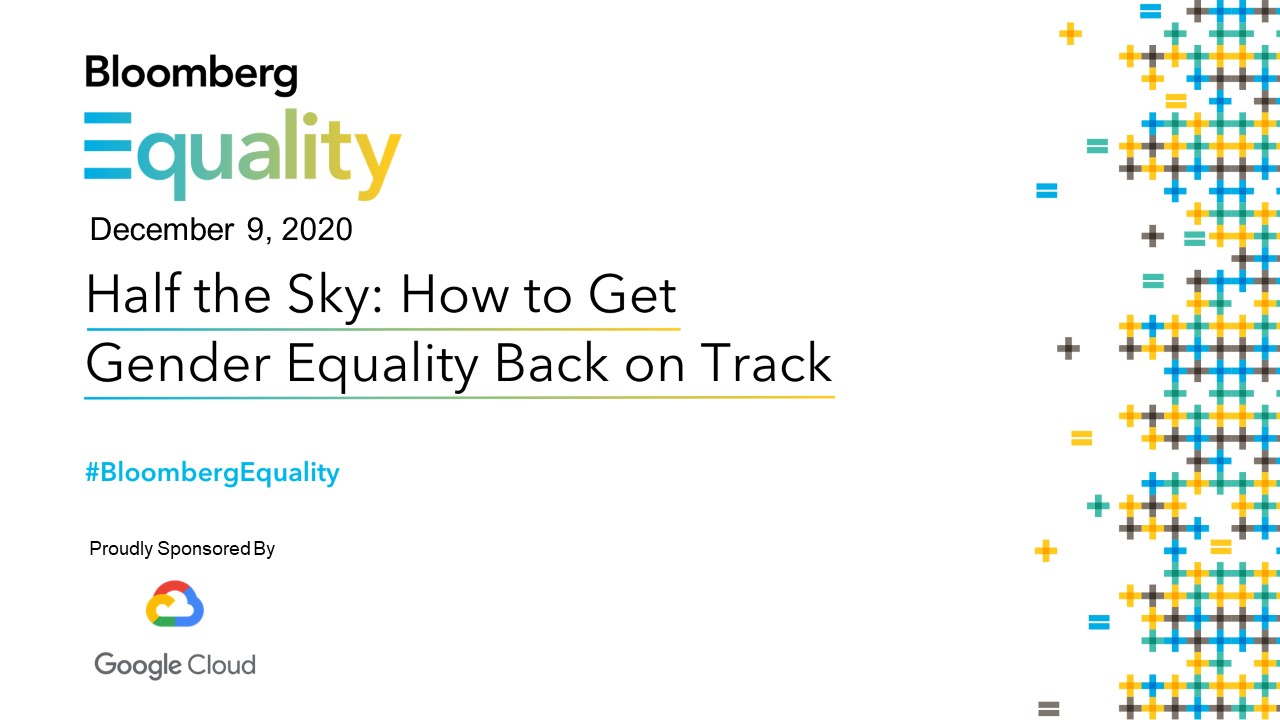The pandemic has taken a toll on people all around the world. It has impacted women differently — and disproportionately. While men bore the brunt of job losses during previous economic downturns, this time, hundreds of thousands of women are out of work because of how this crisis has impacted certain industries and the roles within them. That’s the impact on those doing paid work. With billions of people staying home, school closures and communities in lockdown, the demand for unpaid work — cooking, cleaning, child care, supervising home school and looking after extended family — has surged. The pandemic has made the balance even more lopsided. The number of domestic violence cases has spiked since lockdowns were imposed in various parts of the world — again, most of the victims are women. There are real concerns that the Covid-19 downturn could profoundly impact this generation of working women for decades to come. Unless we act now. On December 9, Bloomberg convened influential voices to discuss how to get back on track toward creating a more equal and gender-balanced workforce.
- Dr. Halima Begum, Director, The Runnymede Trust
- Cherie Blair CBE QC, Founder, Cherie Blair Foundation for Women
- Lisa King, Director of External Communications, Refuge
- Shauna Olney, Chief of the ILO’s Gender Equality & Diversity Branch, United Nations
- Felicia Willow, Chief Executive, The Fawcett Society
- Mallika Kapur, Deputy Global Editor, Bloomberg Live
- Simone Andrews, Analyst, Bloomberg Intelligence
- Zoe Schneeweiss, Economics Editor, Bloomberg News
Below are some highlights from the event.
Click here to access videos of all the sessions.

On Women in the Workforce Being Disproportionately Affected by the Pandemic: Speaking about the different impact on and different priorities for women business owners, Cherie Blair CBE QC stressed the need to invest in women-led businesses at all levels. “What we know is that women don’t get the investment that men seem to attract…There’s a lot more we can do about ensuring as we come out of the pandemic, we target resources into women-led businesses at all levels to ensure women get a fair share of the expansion that we hope to see in the economy eventually. And the reality is that if we just leave that to chance it won’t happen.” Blair talked about the importance of “sisterpreneurs” versus the old boys’ networks as a support system.
On the Data Behind How the Pandemic Affected Women: When it comes to the unemployment rate, female workers have been hit hardest by the pandemic globally. As Simone Andrews, Analyst, Bloomberg Intelligence, explained, “In the United States, for the first time, female workers had a higher unemployment rate than men in a recession. In this pandemic-related recession, women have an unemployment rate of 16% compared to men, which is 13%.” It was a similar trend in Europe. The labor dynamics were exacerbated by the fact that women workers tend to be in industries that were hardest hit by the pandemic — the service industry, hospitality, tourism and front line jobs.
On What Changed for Women During the Pandemic: Shauna Olney, Chief of the ILO’s Gender Equality & Diversity Branch, United Nations, shared their most recent estimate of the impact on jobs — 500 million equivalent full-time jobs have been lost, with women hit the hardest. “The sectors that have been hardest hit in the pandemic are where women predominate and areas where we have seen the biggest decline. They also heavily dominate the front line workers so they are hit twice — they’re hit in the sectors where the jobs are being lost and in the sectors where they are most at risk in terms of their health.” Olney also cited a third way in which women have been disproportionately affected — by the home education of children. Olney concluded, “Women’s employment prospects are very much defined by their domestic responsibilities in a way that men’s aren’t.”
On the Impact of the Lockdown on Working Mothers in the UK: The first lockdown had a huge impact on mothers. “They were doing two hours less paid work a day and two hours more child care. Mothers were taking on a disproportionate burden, said Felicia Willow, Chief Executive, The Fawcett Society. Willow stated that mothers were 1.5 times more likely to have lost their jobs during the first lockdown and that women have also experienced higher levels of anxiety than men as a result of the impact of Covid.
On the Impact of the Pandemic on Black and Minority Ethnic Women (BME) in the UK: “For BME households post-Covid, almost a third of those households will have lost their wage earner and they would be lucky to be on furlough,” stated Dr. Halima Begum, Director, The Runnymede Trust. She described how BME women were amongst the worst impacted in the last ten years by public cuts and the double whammy they face as women and as Black and Asian minorities who suffer racism in the workplace.
On Domestic Violence During the Lockdown in the UK: The evidence and statistics show that Covid has exacerbated domestic violence and abuse. As Lisa King, Director of External Communications, Refuge, explained, “Pre-Covid, one in four women were experiencing domestic abuse and two were being killed every week in England and Wales. In Covid times, especially during lockdown, and certainly the first lockdown, there was a massive surge in calls and contacts to the national domestic abuse helpline that Refuge runs. The figures that we saw were frightening in terms of demand increasing, especially at certain times during that summer period…. Statistics released by other organizations counting dead women cited a doubling of the homicides during those first few weeks of lockdown.”
Bloomberg Equality — Half the Sky: How to Get Gender Equality Back on Track Was Proudly Sponsored By

——————————
Join the Conversation: #BloombergEquality
Instagram: @BloombergLive
LinkedIn: Bloomberg Live
Twitter: @BloombergLive
Interested in more Bloomberg Live virtual events? Sign up here to get alerts.
——————————